Tate is a leading centre for research in art history, curatorial practice, collection care, conservation, heritage science, museology and creative learning. Through project-based and ongoing practice-based enquiry, research at Tate generates insights and outcomes of value to the cultural and academic sectors in the UK and internationally.
This 2022 revised Research Strategy is informed by Tate’s overarching mission, purpose and vision1 and the three current institutional priorities:
- Achieving change in who engages with Tate
- Achieving change in who works for Tate and how they are looked after when they do so
- Using the collection more to meet the needs of our public and business model2
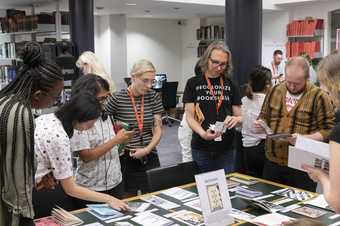
Tate Library zine collection launch, Tate Britain, 2 August 2019
Photo: Sam Day
Vision for Research at Tate
To create a vibrant research culture across Tate that generates high quality3 ethical and sustainable research about art, ideas and practices of institutional, national and international significance, shared openly and accessibly.
Aims
- To enrich Tate, developing new knowledge and partnerships, whilst enhancing the quality and originality of our ideas and the thoughtfulness and effectiveness of our practice, always mindful of the capacity of staff and collaborators
- To contribute to scholarly and practice communities, supporting and providing leadership across the sector and generating new insights that build and embed equitable, transparent, anti-racist research practices at Tate and more widely
- To enhance people’s knowledge and experience, developing and exchanging knowledge equitably and ethically in ways that engage people within and beyond the academic sector and Tate’s existing core audiences
Objectives
- To deepen and widen knowledge and understanding of Tate’s collection and its history, increasing access to information, and supporting informed criticality towards its interpretation
- To support and facilitate research by curators and other Tate staff that contributes to and extends from a diverse and innovative public programme, including displays, exhibitions, events and publications
- To collaborate with colleagues across Tate to nurture and showcase the range of research activity taking place across the organisation, embedding ethical, care-full scholarly and practice-based research
- To work in collaboration with colleagues at Tate and externally to support major externally funded research initiatives – notably the British Art Network and Hyundai Tate Research Centre: Transnational
- To work with academic and non-academic collaborators, generating insights and knowledge to inform relevant disciplinary fields and provide solutions to challenges encountered in Tate’s practice and more widely
- To raise the profile of research internally and externally, communicating its value and relevance
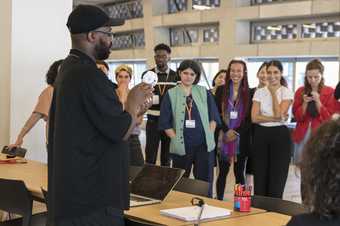
Contested Spaces workshop led by artist Harold Offeh as part of Tate Intensive, July 2018
Priority themes
Recognising Tate’s institutional priorities, the following interconnected, inter-departmental and cross-disciplinary themes provide a framework through which research activity across Tate can operate. Research on and around the collection underpins each theme, while digital is a feature of all four. Research across Tate will not be confined to these themes, however particular attention and resources will be devoted to furthering enquiry and activity in these areas.
- Curating4 and the collection in relation to the global, national and local
- Interrogating the transnational
- Resituating British art; its history, generation, acquisition, cataloguing and display
- Innovations in collection management, development, conservation and access
Addressing the evolving needs of Tate’s diverse collection alongside developments in library and archival practice
- Progressing museum practices and histories
- Contemporary concerns including decoloniality,5 representation, diversity and identity politics; their impact on art museum collections, practices, structures and audiences
- Ecology, sustainability and the climate emergency
- Creative learning and new models of public and participatory practice
Interrogating and evidencing the nature and value of learning and engagement with and through art/Tate’s collection and innovations in museum participation
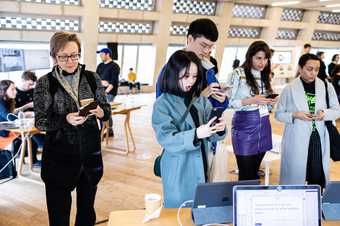
Lives of Net Art workshop day, part of Reshaping the Collectible: When Artworks Live in the Museum, Tate Modern, 4 April 2019
Photo: Hydar Dewachi
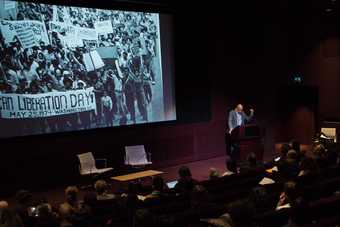
Russell Rickford speaking at ‘Axis of Solidarity: Platforms, Landmarks, Futures’, Hyundai Tate Research Centre: Transnational, 23–25 February 2019
Photo: Jacob Perlmutter
Mechanisms – how we work
- Nurturing practice-based research – assisting staff as researchers by supporting their ongoing embedded research activities, building the intellectual and supervisory capacity of the museum, innovating with forms of practice-based research and reflective practice for museum professionals, and surfacing and making accessible the varied research practices across Tate
- Showcasing Tate research activity through facilitating internal research seminars
- Working with individual researchers – nurturing individual research projects through the Collaborative Doctoral Partnership scheme and Fellowships programmes, creating the conditions through which external researchers can thrive
- Research publishing and representation – broadening the range and raising the profile and accessibility of Tate’s research publications, working in collaboration with Curatorial, Interpretation, Tate Publishing, colleagues across Tate and external researchers
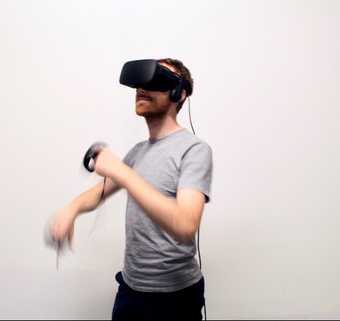
The Preserving Immersive Media research project explores how to effectively care for artworks which use immersive technologies such as virtual reality headsets
Photo: Jack McConchie
- Leading and participating in externally funded research projects – creating opportunities for research across the gallery, strengthening and developing new partnerships, providing opportunities for collaboration and access to a broad range of expertise sometimes from different fields, bringing resources to provide time for reflection, change and future-focused thinking, new knowledge and ideas, enabling staff and the institution to address and adapt to the challenges they face
- Providing research resources and support through the Library and Archive for Tate-based researchers and the wider research community
- Overseeing research governance – supporting the highest standards of research integrity across all aspects of research at Tate to ensure that participants and others have confidence and trust in the methods and findings of our research
- Sector support and guidance – situating Tate as a leader in museum and heritage-focused research, providing leadership in relation to research integrity and ethical practice more widely, working collaboratively wherever possible to nurture research capacity across the sector.
(Research work in close collaboration with the Tate Audience Insights team, drawing on their work and best practice knowledge in producing audience insights. As their remit is on understanding our audiences, this team is based within the Audience division and not within Research).
Published August 2022
Top banner image: The Museum of Things That Don’t Stand Still with University of Westminster at Tate Exchange, 14–17 May 2019. Photo: Dan Weil
